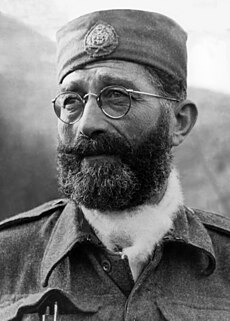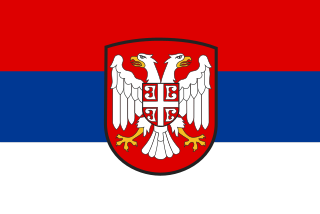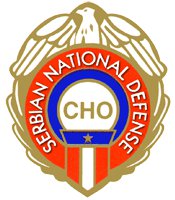 W
WThe term Greater Serbia or Great Serbia describes the Serbian nationalist and irredentist ideology of the creation of a Serb state which would incorporate all regions of traditional significance to Serbs, a South Slavic ethnic group, including regions outside modern-day Serbia that are partly populated by Serbs. The initial movement's main ideology (Pan-Serbism) was to unite all Serbs into one state, claiming, depending on the version, different areas of many surrounding countries.
 W
WUnification or Death, popularly known as the Black Hand, was a secret military society formed in 1901 by officers in the Army of the Kingdom of Serbia, best known for being allegedly involved in assassination of Archduke Franz Ferdinand in Sarajevo and the earlier conspiracy to assassinate the Serbian royal couple in 1903, under the aegis of Captain Dragutin Dimitrijević.
 W
WThe Chetniks, formally the Chetnik Detachments of the Yugoslav Army, and also the Yugoslav Army in the Homeland and the Ravna Gora Movement, was a Yugoslav royalist and Serbian nationalist movement and guerrilla force in Axis-occupied Yugoslavia. Although it was not a homogeneous movement, it was led by Draža Mihailović. While it was anti-Axis in its long-term goals and engaged in marginal resistance activities for limited periods, it also engaged in tactical or selective collaboration with the occupying forces for almost all of the war. The Chetnik movement adopted a policy of collaboration with regard to the Axis, and engaged in cooperation to one degree or another by establishing modus vivendi or operating as "legalised" auxiliary forces under Axis control. Over a period of time, and in different parts of the country, the movement was progressively drawn into collaboration agreements: first with the puppet Government of National Salvation in the German-occupied territory of Serbia, then with the Italians in occupied Dalmatia and Montenegro, with some of the Ustaše forces in northern Bosnia, and, after the Italian capitulation in September 1943, with the Germans directly.
 W
WJoint criminal enterprise (JCE) is a legal doctrine used during war crimes tribunals to allow the prosecution of members of a group for the actions of the group. This doctrine considers each member of an organized group individually responsible for crimes committed by group within the common plan or purpose. It arose through the application of the idea of common purpose and has been applied by the International Criminal Tribunal for the former Yugoslavia to prosecute political and military leaders for mass war crimes, including genocide, committed during the Yugoslav Wars 1991–1999.
 W
WDragoljub "Draža" Mihailović was a Yugoslav Serb general during World War II. A staunch royalist, he retreated to the mountains near Belgrade when the Germans overran Yugoslavia in April 1941 and there he organized bands of guerrillas known as the Chetnik Detachments of the Yugoslav Army.
 W
WThe Mountain Wreath is a poem and a play written by Prince-Bishop and poet Petar II Petrović-Njegoš.
 W
WThe term Greater Serbia or Great Serbia describes the Serbian nationalist and irredentist ideology of the creation of a Serb state which would incorporate all regions of traditional significance to Serbs, a South Slavic ethnic group, including regions outside modern-day Serbia that are partly populated by Serbs. The initial movement's main ideology (Pan-Serbism) was to unite all Serbs into one state, claiming, depending on the version, different areas of many surrounding countries.
 W
WThe Government of National Salvation, also referred to as Nedić's government and Nedić's regime, was the second Serbian collaborationist puppet government, after the Commissioner Government, established on the German-occupied territory of Serbia during World War II. It was appointed by the German Military Commander in Serbia and operated from 29 August 1941 to October 1944. Unlike the Independent State of Croatia, the regime in the occupied Serbia was never accorded status in international law and did not enjoy formal diplomatic recognition on the part of the Axis powers.
 W
WObraz is a Serbian nationalist far-right organization, banned because of its violent activities and anti human rights ideology. The organization is classified as Orthodox by several organizations and government institutions, including the government of the Serbian province of Vojvodina and the Serbian Ministry of Interior. On 12 June 2012 Obraz was officially banned by the Constitutional Court of Serbia.
 W
WOld Serbia is a term in Serbian historiographical discourse that is used to describe the territory that according to the dominant school of Serbian historiography in the 19th century formed the core of the Serbian Empire in 1346-71.
 W
WSerbia was involved in the Yugoslav Wars in the period between 1991 and 1999—the war in Slovenia, the war in Croatia, the war in Bosnia and the war in Kosovo. During this period from 1991 to 1997, Slobodan Milošević was the President of Serbia, Serbia was part of the Federal Republic of Yugoslavia, the International Criminal Tribunal for the Former Yugoslavia (ICTY) has established that Milošević was in control of Serb forces in Bosnia and Herzegovina and Croatia during the wars which were fought there from 1991 to 1995.
 W
WThe Serb Democratic Party is a Serb political party in Bosnia and Herzegovina. It is current leader is Mirko Šarović.
 W
WThe Serbian National Defense Council (SND) is a Serb diaspora community organization whose goal is to protect Serbs, the Serbian Orthodox Church and Serbian interests abroad. It is based in Chicago, and also has chapters in Toronto (Canada) and Sydney (Australia).
 W
WThe Serbian Radical Party is a far-right ultranationalist political party in Serbia that is not represented in the National Assembly. The party was founded in 1991 by paramilitary leader Vojislav Šešelj.
 W
WThe Society of Saint Sava or Saint Sava Society was a Serbian non-governmental association with the aim of maintaining and protecting the Serb people in the Ottoman Empire, in Old Serbia and Macedonia, and in Austro-Hungarian Bosnia and Herzegovina, founded in 1886 in Belgrade, the capital of the Kingdom of Serbia. It was active, with a brief pause during the First World War, until the Invasion of Yugoslavia (1941).
 W
WThe term Greater Serbia or Great Serbia describes the Serbian nationalist and irredentist ideology of the creation of a Serb state which would incorporate all regions of traditional significance to Serbs, a South Slavic ethnic group, including regions outside modern-day Serbia that are partly populated by Serbs. The initial movement's main ideology (Pan-Serbism) was to unite all Serbs into one state, claiming, depending on the version, different areas of many surrounding countries.
 W
WThe term Greater Serbia or Great Serbia describes the Serbian nationalist and irredentist ideology of the creation of a Serb state which would incorporate all regions of traditional significance to Serbs, a South Slavic ethnic group, including regions outside modern-day Serbia that are partly populated by Serbs. The initial movement's main ideology (Pan-Serbism) was to unite all Serbs into one state, claiming, depending on the version, different areas of many surrounding countries.